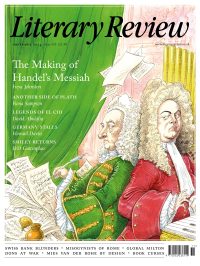Bartolomeo Sala
No Escape
Juice
By Tim Winton
Picador 528pp £22
Set in a distant future where civilisation as we know it has crumbled, Tim Winton’s new novel takes the form of a post-apocalyptic odyssey. It opens with two fugitives, a man and a girl, driving all night across the desert – a nightmarish vision of the Australian landscape central to Winton’s work – in search of shelter. Exhausted and on the brink of desperation, they reach a mine, which looks like it could be a good resting place. They come across another man, an unnamed bowman, who, also fending for himself, is suspicious of their intentions and questions them about who they are and where they are from.
The unnamed narrator, a taciturn, defeated man, backtracks from here and begins – somewhat mechanically – to recount his life story. We learn that he grew up with his stern mother on an agrarian commune. It’s strongly hinted that such an arrangement was meant to stave off those harmful human impulses, like greed, which, unabated, led humanity to its current, barely tolerable predicament. In reality – except for a few cli fi flourishes, such as people spending time underground to avoid the heat – the lifestyle depicted isn’t too different from that of subsistence farmers eking out a meagre living on an unforgiving land. (Lacking Australian points of reference, I pictured something along the lines of the wretched lives of the sharecroppers portrayed by James Agee and Walker Evans in Let Us Now Praise Famous Men.) Under the influence of his mother’s puritanism and feeling a growing sense of restlessness, the narrator becomes involved in a secret cabal of activists called ‘The Service’ who commission him to kill representatives of the old order, remnants of old corporations now turned into clans, who implicitly threaten the morally superior – however miserable – life on the plains.
In its depiction of an extreme form of Luddism, Juice seems to be an exploration of the dark, even fascistic side of the ‘degrowth’ movement. But rather than committing to a novel of ideas, Winton plumps instead for a more familiar human-centred story. The narrator carries out his missions mostly

Sign Up to our newsletter
Receive free articles, highlights from the archive, news, details of prizes, and much more.@Lit_Review
Follow Literary Review on Twitter
Twitter Feed
It wasn’t until 1825 that Pepys’s diary became available for the first time. How it was eventually decrypted and published is a story of subterfuge and duplicity.
Kate Loveman tells the tale.
Kate Loveman - Publishing Pepys
Kate Loveman: Publishing Pepys
literaryreview.co.uk
Arthur Christopher Benson was a pillar of the Edwardian establishment. He was supremely well connected. As his newly published diaries reveal, he was also riotously indiscreet.
Piers Brendon compares Benson’s journals to others from the 20th century.
Piers Brendon - Land of Dopes & Tories
Piers Brendon: Land of Dopes & Tories - The Benson Diaries: Selections from the Diary of Arthur Christopher Benson by Eamon Duffy & Ronald Hyam (edd)
literaryreview.co.uk
Of the siblings Gwen and Augustus John, it is Augustus who has commanded most attention from collectors and connoisseurs.
Was he really the finer artist, asks Tanya Harrod, or is it time Gwen emerged from her brother’s shadow?
Tanya Harrod - Cut from the Same Canvas
Tanya Harrod: Cut from the Same Canvas - Artists, Siblings, Visionaries: The Lives and Loves of Gwen and Augustus John by Judith Mackrell
literaryreview.co.uk